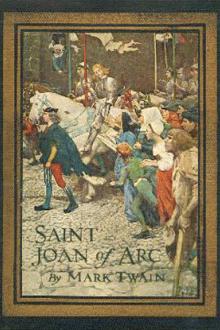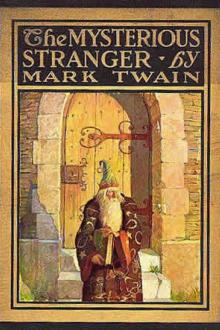Personal Recollections of Joan of Arc, vol 2, Mark Twain [books to read for beginners .TXT] 📗

- Author: Mark Twain
- Performer: -
Book online «Personal Recollections of Joan of Arc, vol 2, Mark Twain [books to read for beginners .TXT] 📗». Author Mark Twain
“Shall we go now?”
“Yes.”
There was no need to explain. Our hearts were in Rouen; we would carry our bodies there. All that we cared for in this life was shut up in that fortress. We could not help her, but it would be some solace to us to be near her, to breathe the air that she breathed, and look daily upon the stone walls that hid her. What if we should be made prisoners there? Well, we could but do our best, and let luck and fate decide what should happen.
And so we started. We could not realize the change which had come upon the country. We seemed able to choose our own route and go whenever we pleased, unchallenged and unmolested. When Joan of Arc was in the field there was a sort of panic of fear everywhere; but now that she was out of the way, fear had vanished. Nobody was troubled about you or afraid of you, nobody was curious about you or your business, everybody was indifferent.
We presently saw that we could take to the Seine, and not weary ourselves out with land travel.
So we did it, and were carried in a boat to within a league of Rouen. Then we got ashore; not on the hilly side, but on the other, where it is as level as a floor. Nobody could enter or leave the city without explaining himself. It was because they feared attempts at a rescue of Joan.
We had no trouble. We stopped in the plain with a family of peasants and stayed a wekk, helping them with their work for board and lodging, and making friends of them. We got clothes like theirs, and wore them. When we had worked our way through their reserves and gotten their confidence, we found that they secretly harbored French hearts in their bodies. Then we came out frankly and told them everythng, and found them ready to do anything they could to help us.
Our plan was soon made, and was quite simple. It was to help them drive a flock of sheep to the market of the city. One morning early we made the venture in a melancholy drizzle of rain, and passed through the frowning gates unmolested. Our friends had friends living over a humble wine shop in a quaint tall building situated in one of the narrow lanes that run down from the cathedral to the river, and with these they bestowed us; and the next day they smuggled our own proper clothing and other belongings to us. The family that lodged us—the Pieroons—were French in sympathy, and we needed to have no secrets from them.
[1] It remained there three hundred and sixty years, and then was destroyed in a public bonfire, together with two swords, a plumed cap, several suits of state apparel, and other relics of the Maid, by a mob in the time of the Revolution. Nothing which the hand of Joan of Arc is known to have touched now remains in existence except a few preciously guarded military and state papers which she signed, her pen being guided by a clek or her secretary, Louis de Conte. A boulder exists from which she is known to have mounted her horse when she was once setting out upon a campaign. Up to a quarter of a century ago there was a single hair from her head still in existence. It was drawn through the wax of a seal attached to the parchment of a state document. It was surreptitiously snipped out, seal and all, by some vandal relic-hunter, and carried off. Doubtless it still exists, but only the thief knows where. — TRANSLATOR.
Chapter 3 Weaving the Net About Her
IT WAS necessary for me to have some way to gain bread for No�l and myself; and when the Pierrons found that I knew how to write, the applied to their confessor in my behalf, and he got a place for me with a good priest named Manchon, who was to be the chief recorder in the Great Trial of Joan of Arc now approaching. It was a strange position for me—clerk to the recorder—and dangerous if my sympathies and the late employment should be found out. But there was not much danger. Manchon was at bottom friendly to Joan and would not betray me; and my name would not, for I had discarded my surname and retained only my given one, like a person of low degree.
I attended Manchon constantly straight along, out of January and into February, and was often in the citadel with him—in the very fortress where Joan was imprisoned, though not in the dungeon where she was confined, and so did not see her, of course.
Manchon told me everything that had been happening before my coming. Ever since the purchase of Joan, Cauchon had been busy packing his jury for the destruction of the Maid—weeks and weeks he had spent in this bad industry. The University of Paris had sent him a number of learned and able and trusty ecclesiastics of the stripe he wanted; and he had scraped together a clergyman of like stripe and great fame here and there and yonder, until he was able to construct a formidable court numbering half a hundred distinguished names. French names they were, but their interests and sympathies were English.
A great officer of the Inquisition was also sent from Paris for the accused must be tried by the forms of the Inquisition; but this was a brave and righteous man, and he said squarely that this court had no power to try the case, wherefore he refused to act; and the same honest talk was uttered by two or three others.
The Inquisitor was right. The case as here resurrected against Joan had already been tried long ago at Poitiers, and decided in her favor. Yes, and by a higher tribunal than this one, for at the head of it was an Archbishop—he of Rheims—Cauchon’s own metropolitan. So here, you see, a lower court was impudently preparing to try and redecide a cause which had already been decided by its superior, a court of higher authority. Imagine it! No, the case could not properly be tried again. Cauchon could not properly preside in this new court, for more than one reason:
Rouen was not in his diocese; Joan had not been arrested in her domicile, which was still Domremy; and finally this proposed judge was the prisoner’s outspoken enemy, and therefore he was incompetent to try her. Yet all these large difficulties were gotten rid of. The territorial Chapter of Rouen finally granted territorial letters to Cauchon—though only after a struggle and under compulsion. Force was also applied to the Inquisitor, and he was obliged to submit.
So then, the little English King, by his representative, formally delivered Joan into the hands of the court, but with this reservation: if the court failed to condemn her, he was to have her back again! Ah, dear, what chance was there for that forsaken and friendless child? Friendless, indeed—it is the right word. For she was in a black dungeon, with half a dozen brutal common soldiers keeping guard night and day in the room where her cage was—for she was in a cage; an iron cage, and chained to her bed by neck and hands and feet. Never a person near her whom she had ever seen before; never a woman at all. Yes, this was, indeed, friendlessness.
Now it was a vassal of Jean de Luxembourg who captured Joan and Compi�gne, and it was Jean who sold her to the Duke of Burgundy. Yet this very De Luxembourg was shameless enough to go and show his face to Joan in her cage. He came with two English earls, Warwick and Stafford. He was a poor reptile. He told her he would get her set free if she would promise not to fight the English any more. She had been in that cage a long time now, but not long enough to break her spirit. She retorted scornfully:
“Name of God, you but mock me. I know that you have neither the power nor the will to do it.”
He insisted. Then the pride and dignity of the soldier rose in Joan, and she lifted her chained hands and let them fall with a clash, saying:
“See these! They know more than you, an can prophesy better. I know that the English are going to kill me, for they think that when I am dead they can get the Kingdom of France. It is not so.
Though there were a hundred thousand of them they would never get it.”
This defiance infuriated Stafford, and he—now think of it—he a free, strong man, she a chained and helpless girl—he drew his dagger and flung himself at her to stab her. But Warwick seized him and held him back. Warwick was wise. Take her life in that way? Send her to Heaven stainless and undisgraced? It would make her the idol of France, and the whole nation would rise and march to victory and emancipation under the inspiration of her spirit. No, she must be saved for another fate than that.
Well, the time was approaching for the Great Trial. For more than two months Cauchon had been raking and scraping everywhere for any odds and ends of evidence or suspicion or conjecture that might be usable against Joan, and carefully suppressing all evidence that came to hand in her favor. He had limitless ways and means and powers at his disposal for preparing and strengthening the case for the prosecution, and he used them all.
But Joan had no one to prepare her case for her, and she was shut up in those stone walls and had no friend to appeal to for help. And as for witnesses, she could not call a single one in her defense; they were all far away, under the French flag, and this was an English court; they would have been seized and hanged if they had shown their faces at the gates of Rouen. No, the prisoner must be the sole witness—witness for the prosecution, witness for the defense; and with a verdict of death resolved upon before the doors were opened for the court’s first sitting.
When she learned that the court was made up of ecclesiastics in the interest of the English, she begged that in fairness an equal number of priests of the French party should be added to these.
Cauchon scoffed at her message, and would not even deign to answer it.
By the law of the Church—she being a minor under twenty-one—it was her right to have counsel to conduct her case, advise her how to answer when questioned, and protect her from falling into traps set by cunning devices of the prosecution. She probably did not know that this was her right, and that she could demand it and require it, for there was none to tell her that; but she begged for this help, at any rate. Cauchon refused it. She urged and implored, pleading her youth and her ignorance of the complexities and intricacies of the law and of legal procedure. Cauchon refused again, and said she must get along with her case as best she might by herself. Ah, his heart was a stone.
Cauchon prepared the proc�s verbal. I will simplify that by calling it the Bill of Particulars. It was a detailed list of the charges against her, and formed the basis of the trial. Charges? It was a list of suspicions and public rumors—those were the words used. It was merely charged that she was suspected of having been guilty of heresies,





Comments (0)